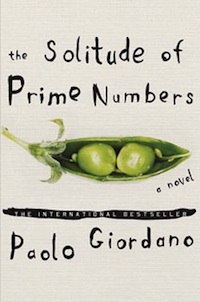One Is the Loneliest Number

As I write this, the honorable literary organization PEN is holding its Sixth Annual World Voices Festival of International Literature, which is a thing of wonder and joy if you are proximal to the universal center of ambition (or are inclined to transport yourself there) and you are a devotee of literature of all stripes. Alas I am the latter and am pathologically determined to demur on the former.
However, as an act of solidarity with the festival’s intention to pay tribute to literature worldwide, I have taken up Italian best seller The Solitude of Prime Numbers (Pamela Dorman/Viking) by Paolo Giordano (translated from Italian by Shaun Whitside) whose popularity has led to significant sales in 38 countries (how many languages does that represent?). Part of the buzz around the book is about the author’s youth—being the youngest-ever winner of Italy’s equivalent to the National Book Award, the Premio Strega, and the fact that he is a PhD in particle physics, which allows for the tired subject of science and literature to arise:
By the way, let’s not forget C.P. Snow and Alan Lightman, and acknowledge Cormac McCarthy’s avid interest in String Theory and contemporary physics.
All right then, Giordano’s debut novel is a love story of two psychologically damaged misfits whose separation and eventual reunion exposes deep concealed emotion and trauma. Novelist John Boyne nails it:
The Solitude of Prime Numbers
